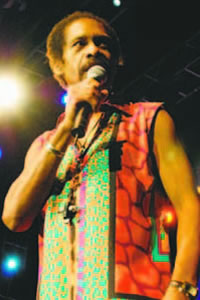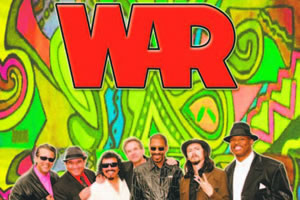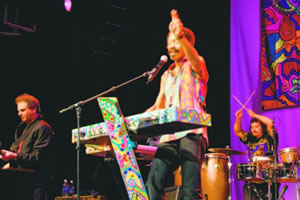Digging The Cool Sounds Of War

Visiting Hawaii is a ‘spiritual experience
Lonnie Jordan, founding member of the band War, talks about his love of Hawaii and the healing power of music
War broke out on the grounds of Kilohana Plantation last weekend. But there weren’t any machine guns or snipers present, only one funky, eclectic musical group broke out in song with instruments as its weapons.
The 1970s band War rocked the crowd April 3 in Lihu’e, performing hits such as Why Can’t We Be Friends? and Low Rider.
Having played in the state before, including a show inside Diamond Head Crater, founding singer and keyboardist Lonnie Jordan says Hawaii fans bring a transcending vibe to the concert.
“I have been to most of the islands,” he says. “They are just so beautiful and I always have a very spiritual experience when I go.”
He brings that feeling with him to the stage, and despite the band’s name, Jordan is an advocate for peace.
“Who doesn’t want peace? Life is for enjoying each and every person,” he says. “There should be no room in this world for hate and negativity.”
But their concerts haven’t always been as peaceful as they are in the Islands. In fact, a particularly rough crowd overseas was the catalyst to one of their most popular melodies.
“There were fights breaking out and almost riots happening,” he recalls. “We had our instruments backstage, and we just start playing a reggae groove and singing ‘Why can’t we be friends?’ The song evolved from there.”

War has been making fans feel good for 40 years
Not all of the group’s songs have come about so quickly.
The members only had an idea for a song, but no lyrics when Low Rider was created. It wasn’t until War’s producer Jerry Goldstein suggested to former band member Charles Miller to sing about his car that the group finally formed the hit.
The track was originally 45 minutes long, but was cut down to the version fans hear on the radio today – widely known for its placement on the Dazed and Confused soundtrack.
“It was used in the movie because the producers felt the song was a good fit,” says Jordan, an avid movie aficionado. “They called us and asked if they could use it and we said, ‘why not?'”
But the most rewarding aspect of being a musician isn’t the blockbuster movie recognition. It’s the fans.
“It’s the way our music can make them feel so good,” says Jordan. “We are like troubadours or doctors on call 24 hours a day.
Our music is healing. Thanks to all the fans, I have been able to perform for as long as I have. They brought me in and they can take me out.”
War enthusiasts also continue to give him incalculable musical influence.

Lonnie Jordan calls fans his biggest inspiration /Photos courtesy Far Out Productions
“They are the biggest inspiration, and they are the ones who have kept me going for 40 years – and will keep me going for 40 more!”
Music was always an integral part of his life. In fact, Jordan had fans as early as childhood when he played piano in church.
“It kept us out of trouble and off the streets,” he says.
But playing songs for the world these days hasn’t always been so easy.
“The most challenging aspect would have to be the travel,” he says. “After a while the travel can wear you down, but it is a necessary part of the experience.”
And with it comes the unparalleled feeling of performing on stage.
“It is my inter-action with the audience that really dictates the show,” Jordan says. “Each night is different because the fans have a different vibe. Every show is a party, though, and everyone has a good time – me, the band and especially the fans.”
Some of his most memorable moments are when the audience sings so loud, they overpower his voice.
“I love feeling that positive energy from the crowd and then we are all playing music together,” he says.
And the good news for Jordan is that he never gets nervous.
“I always feel very comfortable going out on stage,” he says.
As far as plans for the band’s future are concerned, Jordan hopes to continue touring and working on new material.
“I can’t think of anything I would rather do than make music for people,” he says. “There is nothing more rewarding.”



